Invasion Day 584 – Summary
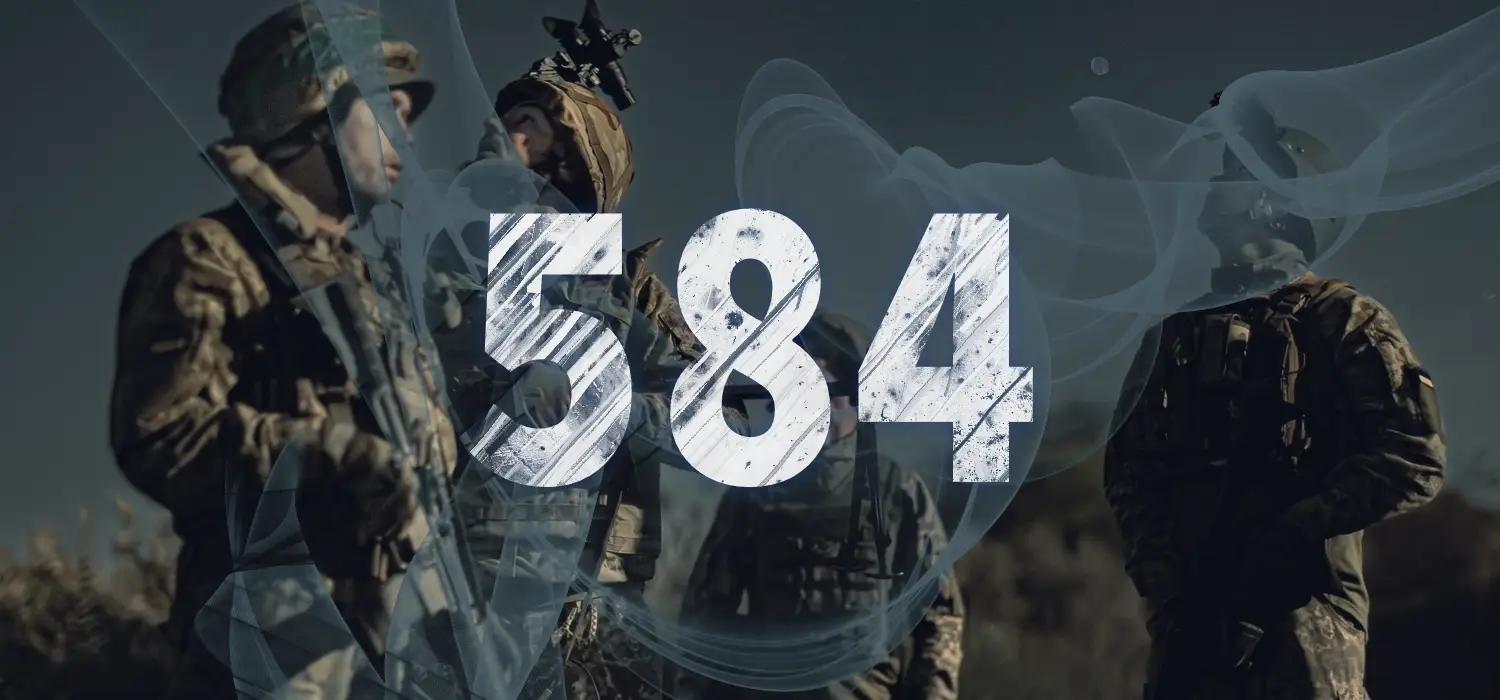
The summary of the situation of Russian re-invasion to Ukraine covering the recent developments on the battlefield, as of 30th September 2023 – 22:00 (Kyiv time).
Sloboda Front
includes the area of between Oskil and Aydar river
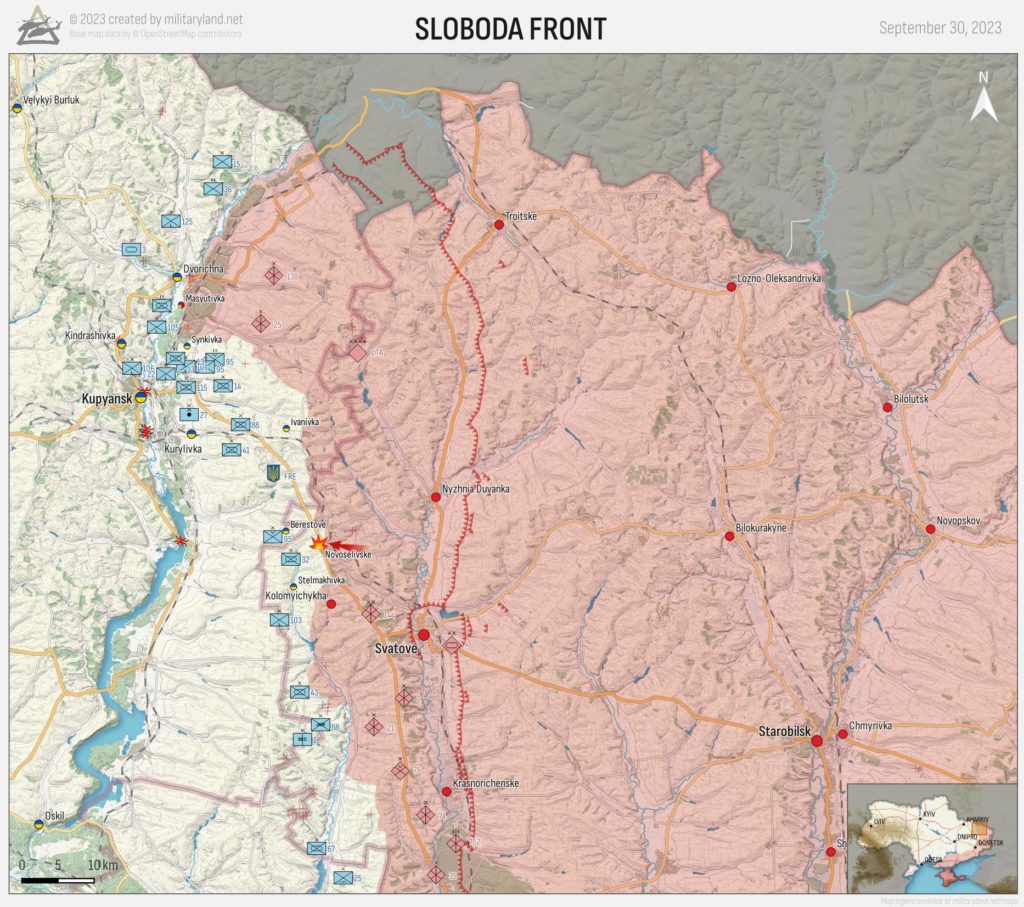
- Russian army targeted a pontoon bridge across Oskil river west of Kurylivka. (source)
- Aviation of the enemy bombed a pontoon bridge across Oskil river just south of the first one. (source)
- Russian forces targeted a bridge across Oskil river at Senkove in Kharkiv Oblast (west of Berestove). (source)
Ukrainian General Staff reports repelled attacks in the vicinity of:
- Novoselivske
Bakhmut Front
includes the vicinity of Bakhmut
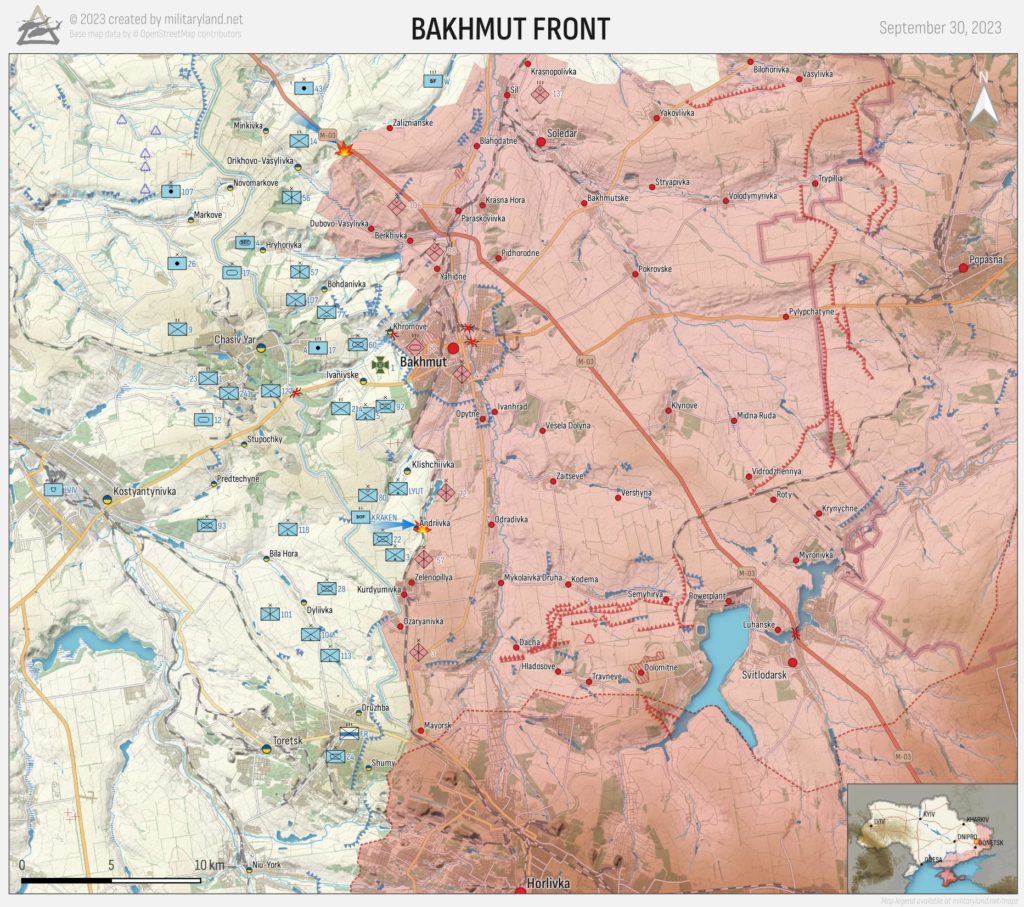
- Ukrainian forces advanced in the area north-east of Orikhovo-Vasylivka settlement. (source)
- Ukrainian troops crossed the railway in the vicinity of Andriivka and captured nearby treelines. (source)
Ukrainian General Staff reports repelled attacks in the vicinity of:
- Klishchiivka
Donetsk Front
includes the center and southern part of Donetsk Oblast
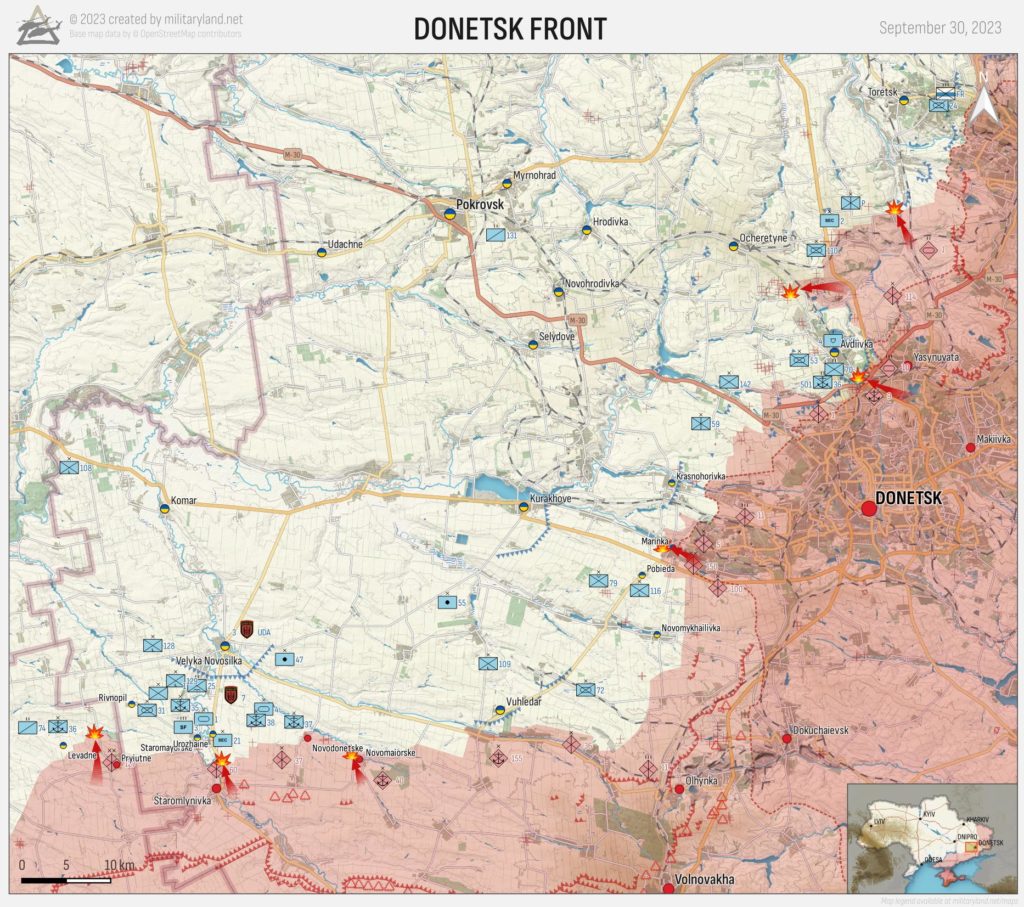
- Russian forces recaptured the northern part of Novomaiorske and pushed Ukrainian troops out of the settlement. (source)
- The enemy attempted to advance in the direction of Urozhaine, but the attack was repelled. (source)
- Russian army targeted a Ukrainian train with equipment north of Pokrovsk, ~45km behind the frontline. (source)
Ukrainian General Staff reports repelled attacks in the vicinity of:
- Marinka
Zaporizhzhia Front
includes the Zaporizhzhia Oblast
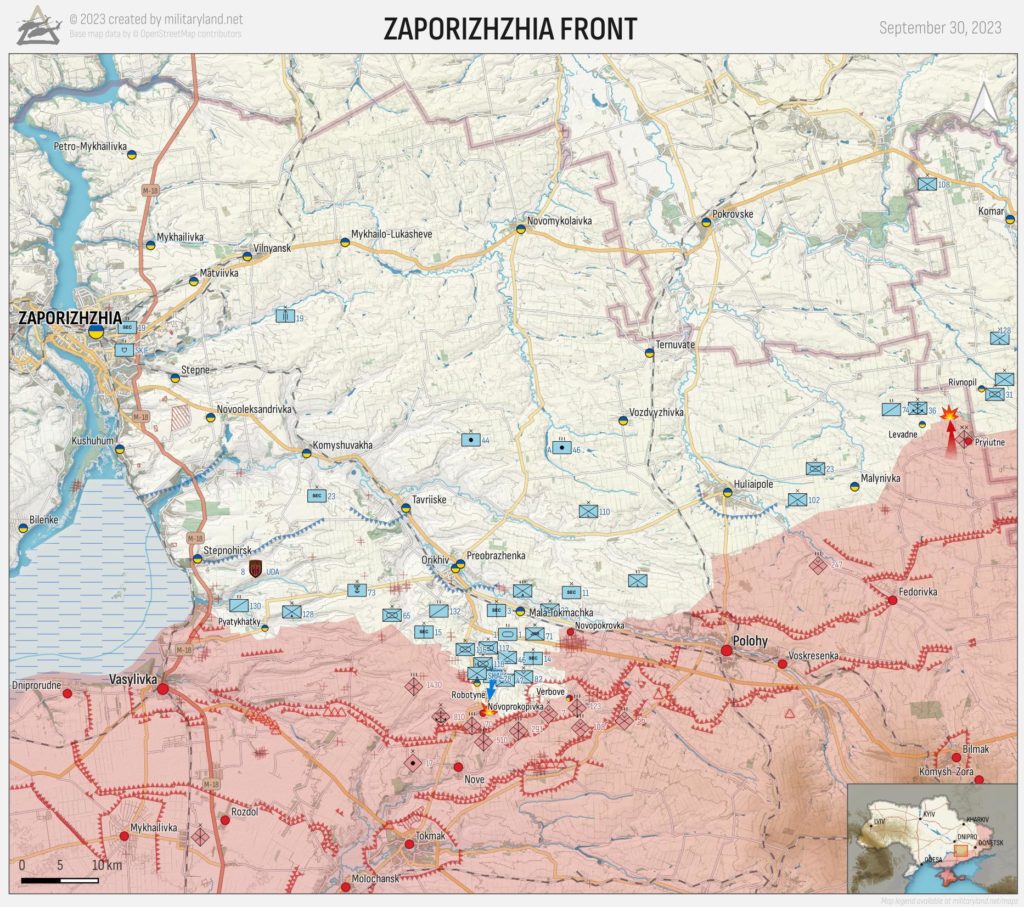
- Lot of activity on FIRMS in the area of Novopokrovka in the last 24 hours (red crosses overlay).
- Ukrainian forces entered the north-eastern outskirts of Novoprokopivka, but the attack was eventually repulsed, and Ukrainian troops retreated north. (source)
- Russian forces targeted a Ukrainian train carrying vehicles near Vilnyansk, ~45km behind the frontline. (source)
Ukrainian General Staff reports repelled attacks in the vicinity of:
- No activity reported.
Kherson Front
includes the left bank of Dnipro river south of Kherson and Kakhovka
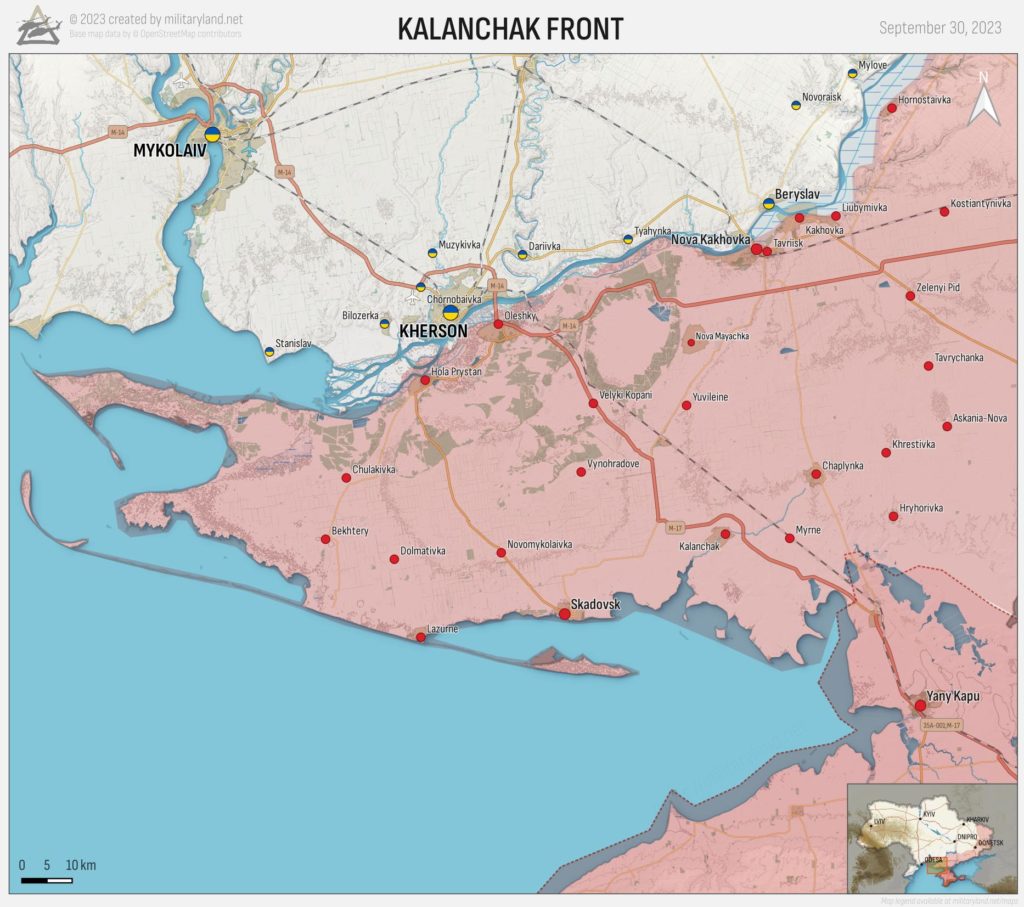
- Russian army hit a Ukrainian airbase in Mykolaiv (55 km behind the front) and Kryvyi Rih (66 km behind the front), and damaged at least two MiG-29 jets. (source)
Ukrainian General Staff reports repelled attacks in the vicinity of:
- No activity reported.
Crimea
occupied Crimea, without map
- Ukrainian Army attacked the Black Sea Fleet headquarters in Sevastopol. (source)
This summary and detailed maps are based on the following sources:
General Staff of the Armed Forces of Ukraine, official media channels of Ukrainian regional administrations, Ukrainian Ministry of Internal Affairs, Security Service of Ukraine (SBU) and geolocated footage.
We also thank the following Twitter users for their geolocations and amazing work: @neonhandrail, @auditor_ya and the team at @geoconfirmed.
Do you like our summaries, follow Twitter daily and have interest in geolocations? I’m looking for volunteers to help me to monitor the situation and write the summaries with me. If you are interested, please contact us via email [email protected].
Our community |
Mentioned Units |
No unit mentioned.

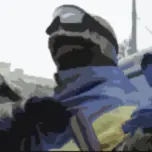



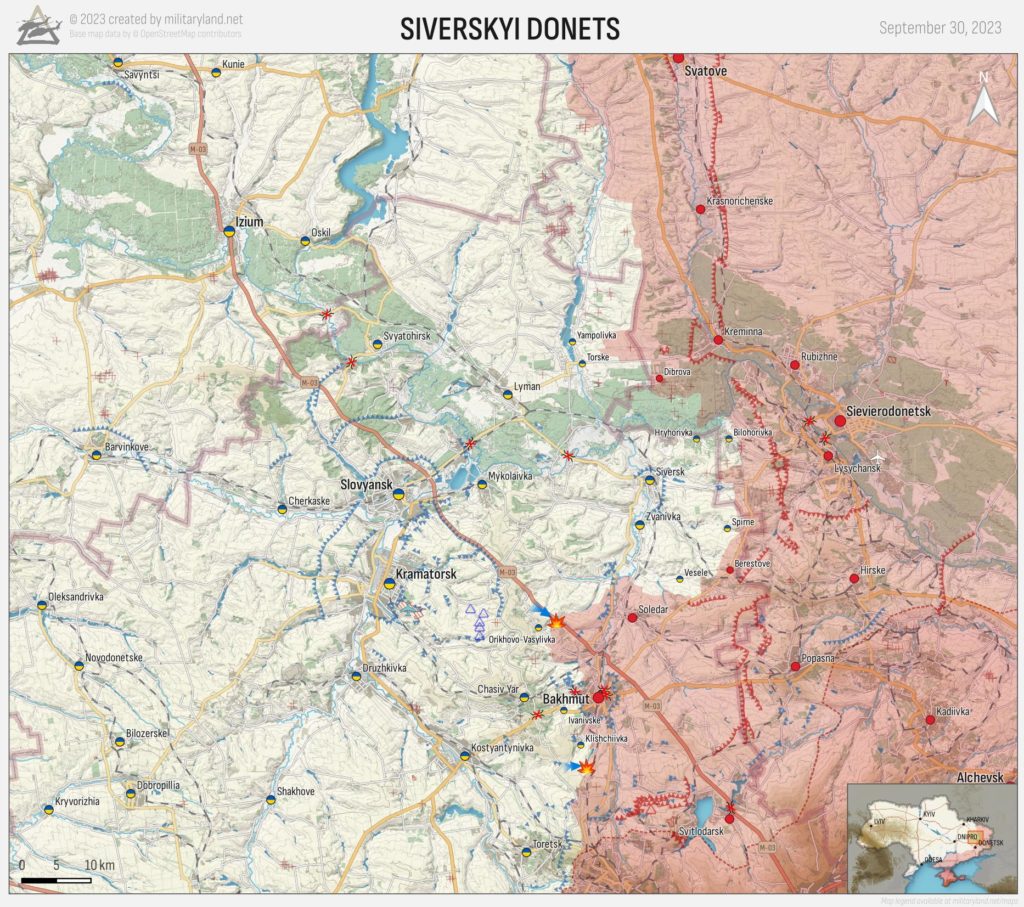
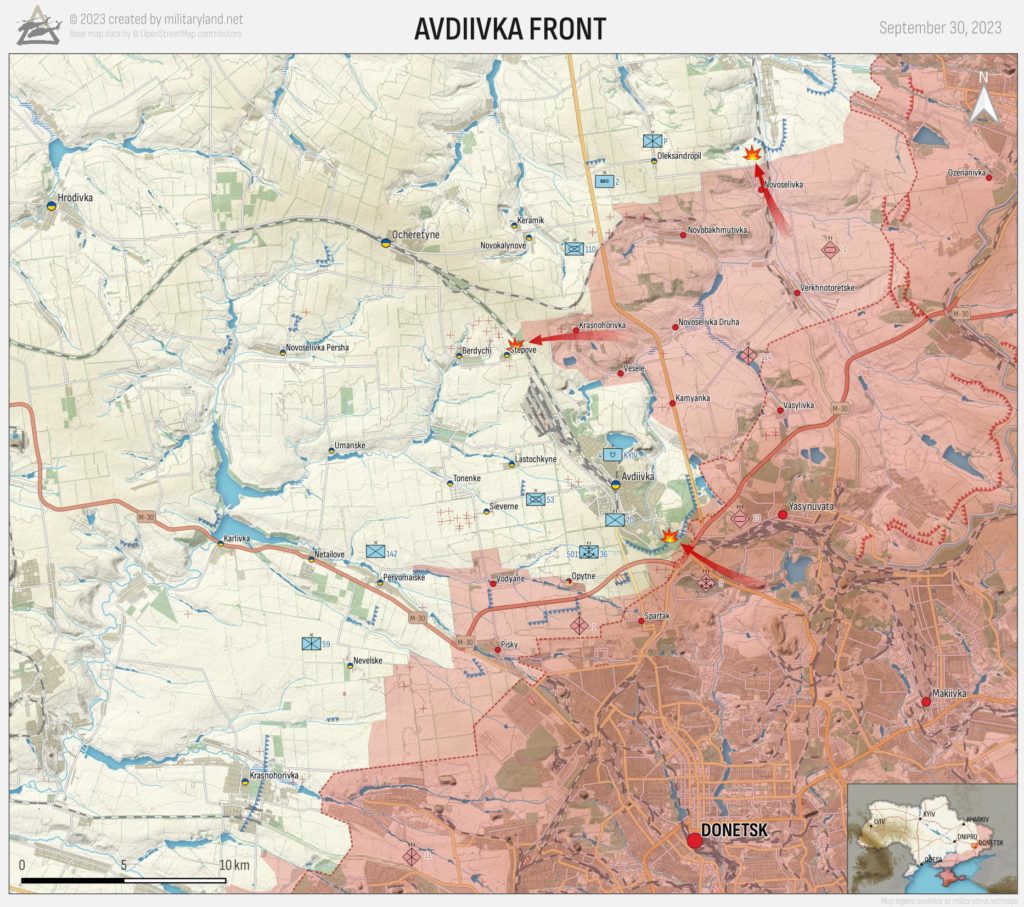

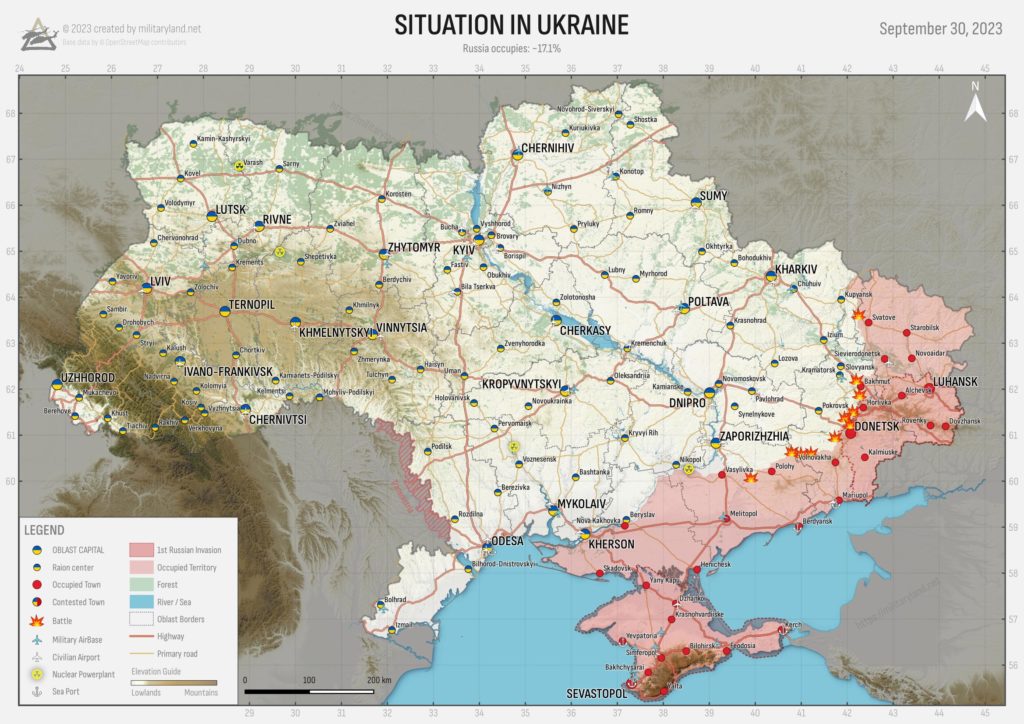
ISW analysis:
https://tny.lv/FFow3
In contrast to previous analyses, the ISW is now clearly distancing itself from negotiated solutions. The conclusion is that Putin must be made aware that he is not winning this war.
I think that this assessment is due to the fact that direct, personal access to Putin is currently impossible and therefore negotiations cannot be held directly with Putin.
He has become very isolated and does not allow any attempt to get in touch with him personally. Apart from his allies, Putin has not allowed any politicians to get close to him since the war. And this unfortunately makes a negotiated solution impossible. ISW didn’t mention that, but I think it has an influence on the current assessment.
During the first few months of the war, Western politicians were at least able to telephone Putin, but according to Schulz, there has been radio silence for six months (for all Western allies). Unfortunately, contact with the Kremlin and decision-makers other than Putin won’t be of much use in the end if Putin remains stubborn.
Putin is not winning the war right now, and he is likely aware of that. ISW writes, that he, or Russia, must be forced to accept defeat for a long term peace. There is a difference here and it is important.
He’s waiting and essentially betting on diminishing western support. The pressure on the west is higher than that on Russia. Because there is no freedom of speech in Russia, the lack of dissent makes the population overwhelmingly support the dictator, whereas in the west it’s easy to spread pro-Russian propaganda and it’s saddening to see how many buy it or become at least ambivalent
I feel like spreading ambivalence (which is a lot easier to spread than “pro-russianness”) is the biggest weapon of the Russian propaganda machine and it’s dangerously effective
Yes, you are right and this goes a lot further, basically Russia declared hybrid war on us, on our way of life, some time ago and it is unclear if they may win it. But I don’t see Russia winning the waiting game in Ukraine. The economical situation is deteriorating and the war is super expensive. We basically caught Putin in a very bad move, we just have to play it to the end without… Read more »
Then the ISW formulated it incorrectly. You can’t force someone to do anything without threatening violence, coercing or blackmailing them.
Unless Putin dies, is overthrown, loses elections, or changes his mind, he will never admit defeat. Even if it means he has 1 million Russians on his conscience.
For the record, Ukraine captured two settlements in September, bringing the number of settlements that changed hands to 16 (UA + 14; RU + 2). Of note, Ukraine’s most successful month was June (+9) while the following three months yielded poor results (+ 5).
Do you have net numbers, villages and/or km2 for the year? Should be pretty even…
In the first nine months of the year UA captured more km2 (approx. 250-300 km2). Concerning the number of settlements that changed hands, there is a slight RU advance (16-14).
Actually, it’s even 14-14 because the Russians lost Klishchiivka and Andriivka they captured in January.
Well, Soledar and very much Bakhmut are on a whole other level than those Andriivkas and co. This metric goes to Russia easily right now. Thx
For the record, Ukrainian progress are not measured by the number of liberated villages, but how the war of attrition is going.
By this measure, June was the worst month for Ukraine and August / September the best ones.
Attrition measured by whom? What are the benchmarks, indicators?
Ukraine said, that Tokmak is the minimum goal for this counteroffensive.
Correct
Yes. So probably Tokmak is not the goal of this counteroffensive.
Ragnar Gudmundsson’s website provide a lot of data about that (Ukrainian MoD announcements and oryx-recorded losses, as well as Russian officers KIA, and other data collected).
And there are also other indicators, such as FIRMS data suggesting Ukrainians now have a superiority in artillery. I talk about it in my monthly analysis, if you are interested.
Wearing down the enemy is an instrument to achieve the goal – capturing more territory – but it is not an objective in itself. Progress is therefore measured by the number of settlements and square kilometers captured/liberated.
settlements didnt count. square kilometers is better.
But you also have to count the tactical or strategic value.
For example, breakthrough 2 strategic defensives lign in the south is more important than loosing few fields in the north with low tactical value.
Yes, square km is a bit better, but in the end Ukraine will not achieve its goal by taking a few village or 100 square kiliometer each month. They need first to destroy, or weaken enough the Russian army, and then they can advance. So, territory (even if it is the goal) is not what measure Ukraine success. Destroyed Russian units is what matters.
A battle of attrition is all well and good, but if you want to free the country from RU, the conquest of villages and settlements is also part of it. But it is a great success that RU only conquered two places in 4 months. This means that they are largely no longer able to attack/advance. And without groups like Wagner, it will certainly stay that way for the time being.
I think you are making a wrong conclusion. During the 5-6 months when RU was on the offensive to take Soledar-Bakhmut, UA did not capture a single settlement. Does it imply UA was “no longer able to attack/advance?”. No, the plan was simply to hold the line. Same thing here mutatis mutandis.
Settlements that changed hands since the launch of the c-offensive:
June: +9 (UA)
July: +1 (UA); + 1 (RU)
August: +2 (UA); + 1 (RU)
September: + 2 (UA)
October ???
Talking about adaption: I think both sides are not able to mount offensives that actually lead to breakthroughs with real maneuver phases anymore. Largely due to the modern battlefield not allowing for surprises. Successes will either be grinding or we have a major parameter shift. Those could be waning or surging western support, no Russian mobilization, china or something else all together.
Personally I don’t see any end to this at current parameters and a real shift on the battlefield no earlier than 25, more like 26, at which point Russia should be very worn down. So we basically have to adapt here to largely unchanging frontlines as well.
The October numbers from Oryx and MoD Ukraine.
A interessting note concerning Oryx and Ukrainina numbers on Russian losses. While the ratio between both data sets was largely stable, e.g. 60% for frontline gear, especially if you allow for a hightened difficulty concerning non frontline gear in a more static 23 frontline, this is not true for artillery. The gap is widening here constantly. This seems to be due to the Ukrainian inclusion
of smaller artillery systems, like mortars, which Oryx does not count. So Ukraine reports to destroy a lot more smaller artillelry systems than big artillery systems than it used to. This could point to Russia using less big/more small systems (easier to hide, more ammo, more barrels?) and/or Ukraine having the ability to destroy more of the smaller systems now (cluster munitions, more munitions?)
Maybe. But the ratio confirmer / claimed Russian artillery has always been low anyway.The key observation is that this ratio is higher with more observable systems (tanks, IFV, ships) and lower with less observable systems (drones, artillery).
For smaller systems of artillery, FPV drones might be how ukrainians destroy them.
No, the oryx russian artillery losses to MoD Ukraine reports went from 22,41 % in 2022 to 7,88% in March 23 to September 23. That is already a factor 3 change and July to September would top that easily. It changed from low to closing in on marginal. In the same time spans it went for MRLS from 39.24% to 31,35%.
2022 numbers were higher because Russians retreated and left a lot of equipment, including artillery. But even 22% was low.a
Smaller systems are much closer to the front. Due to the steep fire and the maximum range of 4 km, it is much easier to see in which position the mortar is. And so you can counterattack the mortar much faster.
In Oryx, losses are also enemy conquests. Since the Russians use a lot of portable mortars, they are often left behind when the enemy captures the position.
You can’t disappear quickly with a mortar, so they’re left behind.
And then there is the number of guns… The Russians use at least 3 times more small artillery than large artillery, so 3 times more of them are destroyed.
Before the Russians were on defense, they used much less small artillery (mortars).
A gun like this is much easier to use in defense because the positions are static and you don’t have to drag these things from position to position. But it’s also somehow logical.
I am not sure what the point behind including some Russian deep strikes is, while excluding those before and not mentioning Ukrainian deep strikes, e.g. the hugh munitions warehouse in luhanks. To be frank, I don’t get it at all.
It actually feels like the site has been hacked by Russian propaganda.
I think Jérôme is concerned about these strikes, which may indicate that Ukrainian air defence is weakening.
I don’t get the air defense point. Shaeds fly all over the place, how the hell is Ukraine supposed to cover all rail tracks? Russia is copying Ukrainian strategies, to give them a platform for it, while never including those strikes before doesn’t make sense to me.
The war evolves, summaries evolve as well. I could imagine a separate weekly summary for the strikes, but who’s gonna write it? Putting them in summary is let’s say middle ground I can afford.
If you don’t understand the difference, I can explain. Shahed flies at a given coordinates. In the same case, the drone first noticed the standing echelon with equipment, and then the Iskander flew in afterwards
I was talking about the ‘weakened ukrainian air defense’. If shaeds can fly pre programmed thru half the country, why is a surveillance drone not supposed to?
Simply because they’ve been shot down before. Now they are already posting videos of Kharkiv shot by such drones. It’s a whole different level of awareness of what’s going on
Max shows his true colours. ONE summary includes Russian strikes to emphasize the change in tactics and you freak out. hahaha
You didn’t see my true colours before? Wow, you must be blind. If Jerome thinks it’s wise to amplify a Russian adaption success while ignoring the innovativ Ukrainian successes, fine. I think this war is mostly won or lost in western politics and this site has a direct influence how this war is seen.
It’s mentioned because it’s a significant change of Russian tactics (targeting airfields, bridges and trains).
As for Ukrainian strikes, feel free to share them, I might miss some, but the only one I was able to find was the Krasnodon one.
Rus copying attacks on logististics now is an important development. Do you have any idea with which weapons?
Telegram accounts claimed Iskander, Tornado-G (for artillery) and FABs for the air force.
It really depends on where you draw the line. There are daily news about cottons in those Meltipols, Berdiansk, etc. with long range artillery. Not to mention those extrem ones from last fall. If it is done with iskander, we also may have to start including those scalp strikes, etc. To include those, because Russia delivers good pictures of them and, or they are new doesn’t make sense to me.
It makes sense because they are new, and they are hitting strategically important places which have direct effect on the battlefield (bridges, railways, airports).
Ukraine has hit many airports, harbors, grand ships, planes, headquarters, all of which was new at some point and some a lot more important than those Russian hits last week. I just wonder why you start now and like that. But it is your site, your call.
Kind of feels more like they’re just having more success filming hits with drones. Which could have later been shot down for all we know.
Front lines are more porous than people think. Stuff gets through.
Moscow has hit bridges and rail depots plenty of times in the past, so not sure it’s worth the tizzy some people seem to be having over you noting these.
The Russians have now also understood that a disruption in supplies can temporarily weaken the UKR. Unfortunately, Jerome’s reports do not state whether and how much equipment was destroyed in the attacks.
This is not good news for ongoing offensive operations, such as those demonstrated by the UKR in recent weeks, when an unplanned stop inevitably occurs. RU benefit more from each break than UKR
Interesting detail: the train firing scene is now being filmed by a drone. This means that Ukraine’s air defence has been significantly weakened
Shaed fly thru half the country since a year and you conclude from one surveillance drone active somewhere behind the Frontline that ukraines ad was significantly weakend? Man, and I thought I was based. If these are really the first Russian strikes if this kind, it just shows that Russia was 18 months to dumb to do it before.
They didn’t think it was necessary because the UKR had less equipment than the Russians anyway.